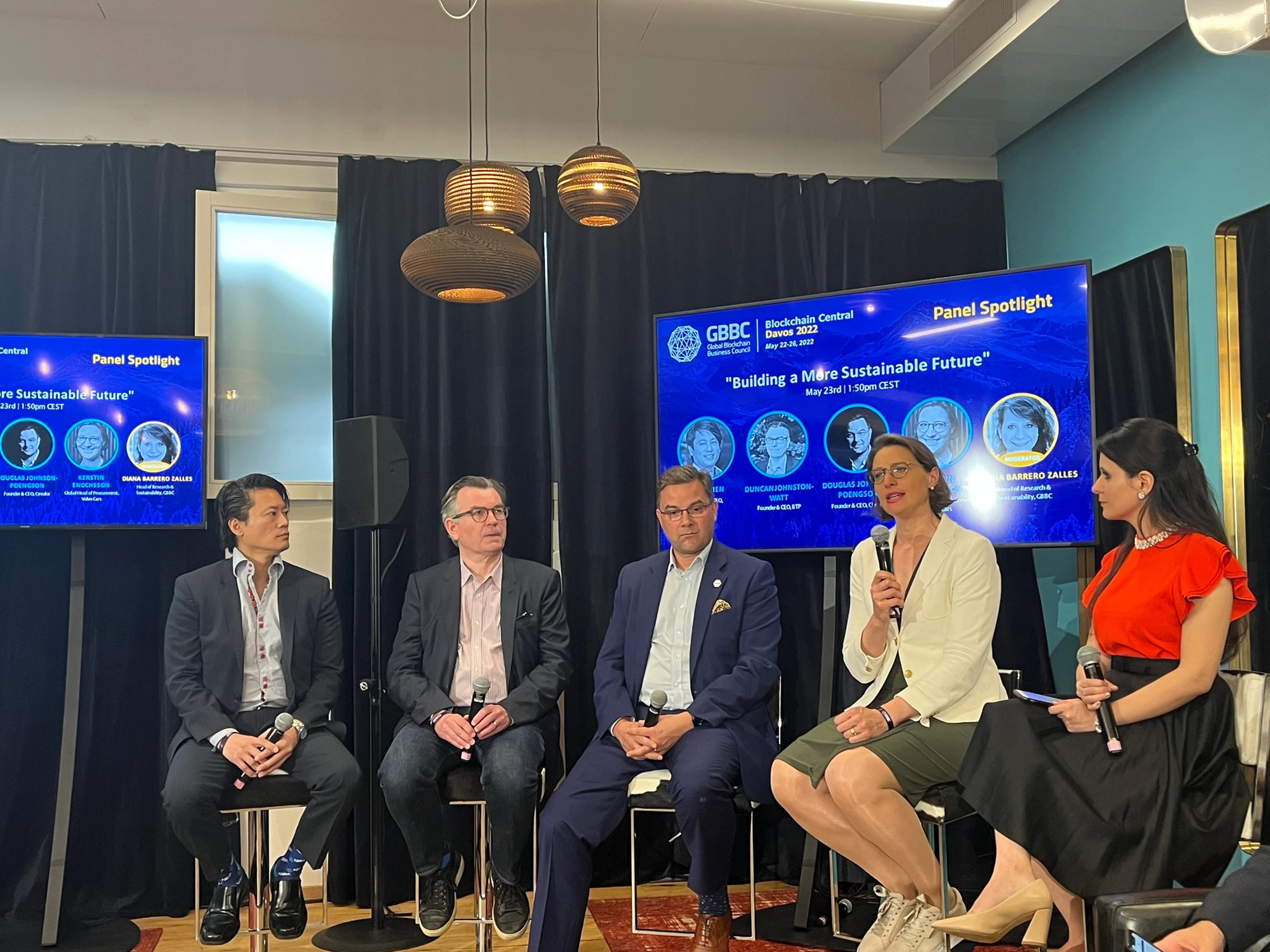Not just another link in the (block)chain
We’re no stranger to blockchain technology – it’s been an important tool in our responsible sourcing of batteries. Now, we’re looking into how we can make more use of the technology.

Kerstin Enochsson joined a panel discussion on blockchain and sustainability in Davos, Switzerland.
How can companies use blockchain technology to improve their work with sustainability? That was one of the questions on top of the agenda on 23 May, as our head of procurement Kerstin Enochsson took part in a blockchain panel discussion in Davos, Switzerland.
The event took place alongside a huge happening that completely takes over the small Alpine resort town once a year: the World Economic Forum. For a few days every year, the Promenade in Davos becomes a hotspot for Fortune 500 companies, national governments and global changemakers to get together and discuss global issues.
With our ambitions of becoming a fully electric carmaker, batteries and the materials used to make them are becoming more and more important for us. So it made sense for us to take the stage and talk about how we as a carmaker use blockchain technology to boost the traceability of raw materials.
Battery materials such as cobalt, nickel and lithium can be challenging to source, both when it comes to upholding ethical business standards as well as the potentially high CO2 emissions in the supply chain. For example, depending on the source of the nickel, CO2 emissions can unnecessarily be 20 times higher than the best alternative.
“We want to lead and break new ground, so it’s natural for us to embrace new, interesting technologies such as blockchain,” says Kerstin Enochsson. “Since 2019, we’ve been using blockchain technology to track cobalt both in our fully electric cars as well as our plug-in hybrid cars. We do this to help customers feel more confident that the battery in their Volvo has been responsibly sourced.”
We want to make sure that the cobalt used in our batteries lives up to our sustainability standards, which is why we in 2019 became the first carmaker to start implementing traceability of cobalt used in our batteries by applying blockchain technology.
Now, we’re exploring how we can make more use of the technology.
“We’re planning to use it to track and reduce CO2 footprints in our supply chain, which will be a fantastic step forward,” Kerstin Enochsson says. “We’re also working on getting lithium and nickel in the blockchain as well.”
“We want to lead and break new ground, so it’s natural for us to embrace new, interesting technologies such as blockchain,” says Kerstin Enochsson.
Within supply chains, the blockchain technology creates records of transactions that cannot be changed undetected – this helps us increase transparency and traceability of materials, as we can verify the origins of raw materials. In addition to blockchain technology, we conduct third-party audits among suppliers within our battery mineral supply chain according to the OECD Due Diligence Guidance for Responsible Supply Chains of Minerals from Conflict-Affected and High-Risk Area – to help ensure that the materials within our batteries are responsibly sourced.
In our use of blockchain technology, we’re working together with blockchain technology provider Circulor, who joined us at the panel in Davos. Our collaboration with Circulor started as we used their technology to implement global traceability of cobalt throughout our battery supply chain.
In 2020, we invested in the company through Volvo Cars Tech Fund, our venture capital investment arm. Going forward, their technology will be integral to our plans to track and reduce our CO2 emissions.
Since we first implemented blockchain technology, traceability has become an even hotter topic across many different industries. This shows us that our work is on the right track and underlines the need for us to continue to find new and better ways to trace material and components used in our cars.
“We believe it is our obligation to sell cars with a scrutinised supply chain, especially when we deal with materials and components that come from high-risk areas,” says Kerstin Enochsson. “We want to ensure that the material we put into our cars are up to our sustainability standards, and that is a process we need to constantly try to improve.”
*The panel was part of the annual Blockchain Central event, which was arranged by the Global Blockchain Business Council, a global industry association for the blockchain technology ecosystem*.